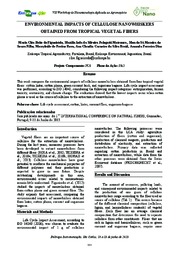Environmental impacts of cellulose nanowhiskers obtained from tropical vegetal fibers.
Environmental impacts of cellulose nanowhiskers obtained from tropical vegetal fibers.
Author(s): FIGUEIREDO, M. C. B. de; MATSUURA, M. I. da S. F.; SOUZA FILHO, M. de S. M. de; ROSA, M. de F.; BRAID, A. C. C. S.; DIAS, A. F.
Summary: Resumo This work compares the environmental impacts of cellulose nanowhiskers obtained from four tropical vegetal fibers: cotton linter, cotton plume, green coconut husk, and sugarcane bagasse. Life cycle impact assessment was performed, according to ISO 14040, considering the following impact categories: eutrophication, human toxicity, ecotoxicity, and climate change. The evaluation showed that the lowest impacts occur when cotton plume is used as the source of cellulose to the extraction of nanowhiskers.
Publication year: 2013
Types of publication: Paper in annals and proceedings
Unit: Embrapa Environment
Observation
Some of Embrapa's publications are published as ePub files. To read them, use or download one of the following free software options to your computer or mobile device. Android: Google Play Books; IOS: iBooks; Windows and Linux: Calibre.
Access other publications
Access the Agricultural Research Database (BDPA) to consult Embrapa's full library collection and records.
Visit Embrapa Bookstore to purchase books and other publications sold by Embrapa.

